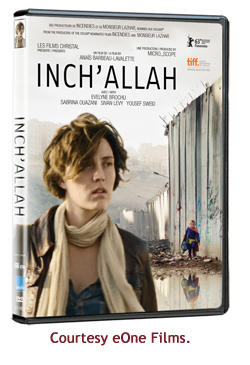 Film: Inch?Allah
Film: Inch?Allah
Writer/Director: Anaïs Barbeau-Lavalette
Cast: Évelyne Brochu, Sabrina Ouazani, Sivan Levy, Hammoudi Elkarmi
Genre: Drama
?The land must not be sold permanently, because the land is mine and you reside in my land as foreigners and strangers.?
Leviticus 25:23
The Slow, Inexorable Path to a Doomed Radicalization
Palestinian urchins sift through the refuse of an abandoned Israeli settlement, searching for anything they can use or sell. They find a naughty magazine with English and Hebrew lettering and quickly huddle around it, chortling happily. Nearby, their pretty young aunt carefully adjusts her hijab so no hairs show. The call to prayer begins.
The mysterious blond Safi haunts this scene and nearly every other (what’s a towheaded boy doing among these swarthy Arabs?). Looking like a small parody of Nietzsche’s Superman, or a member of Hitler’s hypothesized master race, he picks up a cardboard drawing of a blue sky with fluffy clouds and contemplates it. Later we see this picture posted in his family’s dining area.
His grown sister, Rand, now pregnant and awaiting her husband’s sentencing in the Israeli courts, is friends with Chloe (played by Évelyne Borchu), her Canadian obstetrician, who lives on the Israeli side but works at a clinic on the Palestinian side. Deliberately neutral and just a little ignorant of what the world already knows about the conflict, Chloe is nonetheless slowly drawn into the struggle.
Chloe is not entirely likeable; she puts the viewer ill at ease by being somewhat promiscuous in her affections and showing an absence of any firm political stance, a lack that leaves her prey to the contingencies of the situation. Chloe is needy, uncertain, and culturally ignorant, and we see what happens when such people are traumatized after witnessing terrible suffering. If we are to experience Chloe’s world vicariously, It’s our shadow selves that must experience it.
Chloe is also close friends with Ava, an Israeli soldier deeply troubled by what her job as a checkpoint guard demands of her and emotionally battered by the relentless hatred of the Palestinian Arabs. But she identifies with her people and defends them against Chloe’s slowly mounting criticisms.
Yet the Arabs accuse Chloe of being too comfortable on the Israeli side, too free, and too licentious with her Israeli drinking buddies. They resent her attempts to help them and her failure to grasp the immensity of the conflict from their perspective.
She’s faced with the brutal possibility that even though her friends are on both sides, neither side is willing to accept her help or compassion or to help her heal from the horrible things She’s witnessed. ?It’s not your war,? Ava tells her.
Like the Irish, the Palestinians have long held a reputation among other Arab nations for being pugnacious. In this film the boys and even women great with child mouth off mercilessly, challenging the Israeli authorities at every turn, their bravado an entrenched reaction to daily humiliations and a history of pain.
And so It’s heartbreaking to see Rand’s proud brother Faisal at the checkpoint, obsequiously begging the cold Israeli soldier to let his sister, now in the final stages of labour, to cross and enter the hospital. The Arab desperately swallows his pride and starts talking football, trying to find some common ground with which to thaw out the soldier’s apathy.
The title of the film means ?If God wills,? a phrase Muslims are supposed to say before statements of future occurrence. It’s the third film from micro_scope, an independent production company which also brought us Incendies and Monsieur Lazhar (also recommended by the Bard). Inch?Allah they’ll be making more.
Inch?Allah manifests seven of the Mindful Bard’s criteria for films well worth seeing: 1) it is authentic, original, and delightful; 2) it poses and admirably responds to questions that have a direct bearing on my view of existence; 3) it harmoniously unites art with social action, saving me from both seclusion in an ivory tower and slavery to someone else’s political agenda; 4) it inspires an awareness of the sanctity of creation; 5) it displays an engagement with and compassionate response to suffering; 6) it renews my enthusiasm for positive social action; and 7) it makes me appreciate that life is a complex and rare phenomenon, making living a unique opportunity.
Wanda also penned the poems for the artist book They Tell My Tale to Children Now to Help Them to be Good, a collection of meditations on fairy tales, illustrated by artist Susan Malmstrom.

